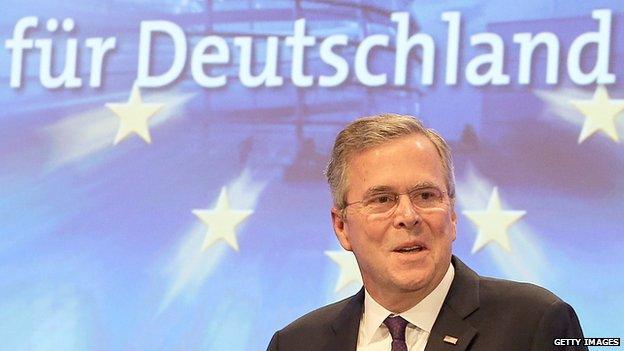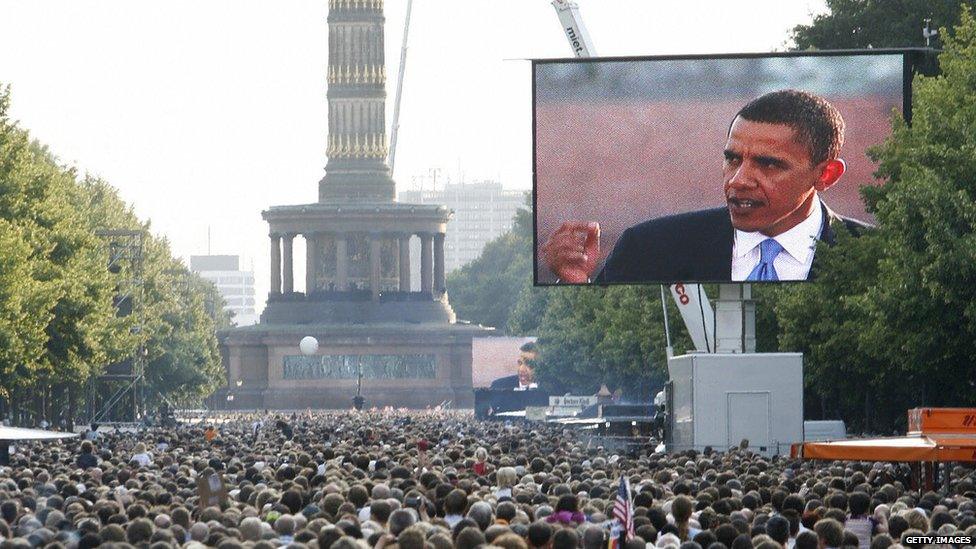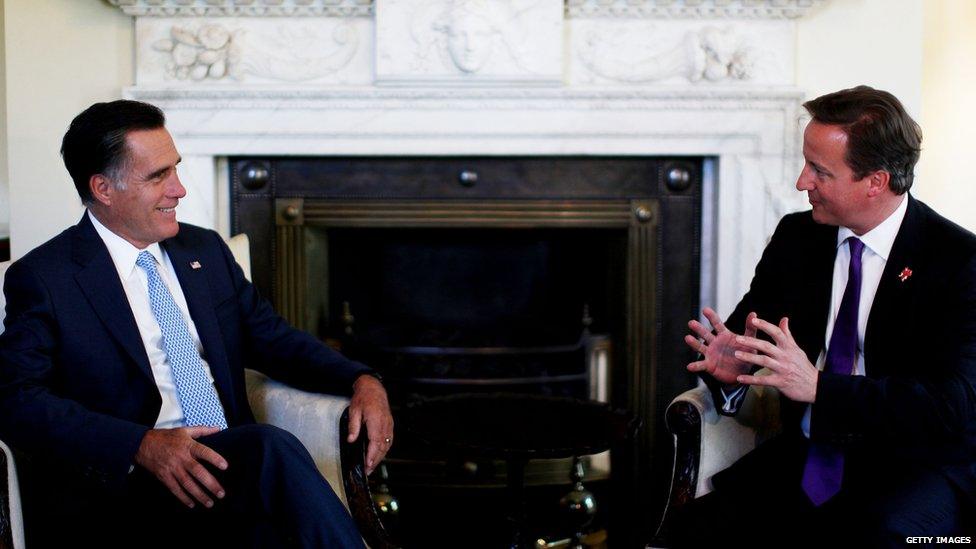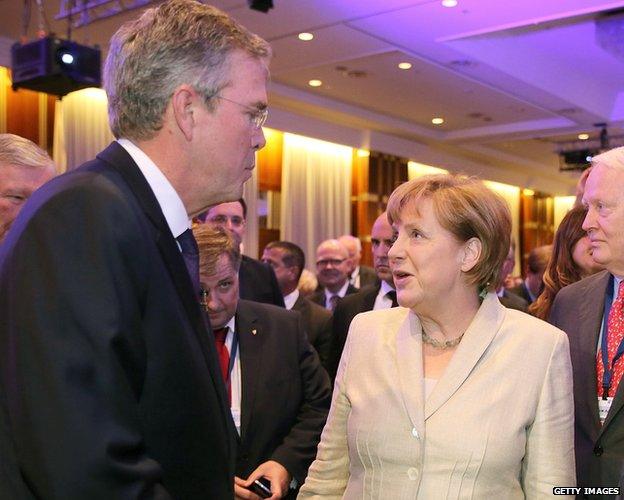Jeb Bush: Foreign policy advisers seek to prevent 'unforced errors'
- Published

Jeb Bush makes his obligatory European tour as a presidential hopeful
Republican presidential hopeful Jeb Bush is wrapping up his trip through Europe, and it seems the worst thing being said about his visit (at least so far) is that he's been a bit boring, external.
The former Florida governor has given a speech emphasising trans-Atlantic partnership in Germany and calling for a hard line against Russian "aggression" during a stop in Poland. Tomorrow he heads to Estonia.
Serious presidential candidates seem obligated to make a trip abroad to prove their foreign policy mettle, but when it comes to such overseas adventures, boring is pretty close to a best-case outcome.
Some might recall the sunny day seven years ago, when then-Senator Barack Obama delivered an address, external in Berlin to an adoring crowd numbering in the hundreds of thousands. More often, however, candidates don't soar on foreign soil, they stumble.
Within the past year Governors Scott Walker, Chris Christie and Bobby Jindal, external have all wilted under the harsh spotlight of the world stage. And then there was Republican presidential nominee Mitt Romney's ill-fated 2012 trip to Europe, where he generated numerous negative headlines, including ruffling British feathers when he wondered if London was prepared to host that summer's Olympic Games.

It's the kind of stuff that gives campaign hands nightmares - particularly the small group of experts and academics who are tasked with educating and counselling presidential candidates on international affairs.
Eliot Cohen, a professor of strategic studies at Johns Hopkins University, advised Mr Romney on foreign policy in 2012. He says the campaign made the mistake of bringing only a "very tight personal staff" to Europe with the former Massachusetts governor.
"It's very hard not to stumble," he says. Aside from incumbent presidents running for re-election, candidates have little in the way of international affairs support staff. Campaign organisations are mostly composed of political operatives and domestic policy experts, and full-time foreign policy advisors tend to be far fewer in number and often with less experience.
Although campaigns bring in outside advisors - releasing lists of names with some fanfare - he says the amount of time they get on a candidate's schedule is limited.
"If you don't have that kind of massive staff working for you, it's so easy to walk into some kind of bog - people just sink in without a trace," Cohen says.
"What I would have advised on that particular trip is just say nice things about the Olympics, that's all," he adds. "It was an unforced error."
According to veteran foreign policy hands who've joined the political fray to help prospective commanders-in-chief, avoiding such unforced errors on foreign policy - as well as developing an overarching international vision - are the primary goals when they sit down with their charges.
Former US Ambassador to the United Nations John Bolton says that "almost every candidate needs to know more about national security".
"The real issue is whether their background, their combination of interest, experience and involvement, gives them an opportunity to exercise an informed judgement," he continues. "Ultimately the most important thing a president needs is not facts, but judgement."

Few presidential hopefuls receive an overseas welcome similar to the one given to Barack Obama during his 2008 speech in Berlin
Mr Bolton, who flirted with his own presidential bid this year, has worked with numerous Republican candidates, including Mr Romney in 2012. His name has been linked to Mr Jindal's campaign, and in February he was overheard, external having foreign policy discussions over dinner with Texas Senator Ted Cruz.
"Some have specific questions that they want to talk about," Bolton says of the candidates he advises. "Others just kind of want to go around the world and so on. Some have specific questions about how a president makes decisions, who they want to talk to and how it works."
The current crop of presidential hopefuls offers a wide range of levels of foreign policy interest and experience. On one end are candidates like Democrat Hillary Clinton, a former secretary of state, and Republican Lindsey Graham, a veteran of the Senate Armed Services Committee.
Others, like Mr Walker of Wisconsin, have little foreign policy experience. He was roundly criticised earlier this year, for instance, when responded to a question about how he'd deal with the Islamic State by comparing it to his confrontations with the public employee unions in his home state.

Eliot Cohen says Mitt Romney made an "unforced error" during his 2012 European tour
According to Michael O'Hanlon, a Brookings institution senior fellow who advised Mrs Clinton during her 2008 presidential campaign, good foreign policy aides need to tailor their approach to the particular candidate's experience - and also their personality.
"Some people are going to welcome more assertive advice than others," he says. "It's one thing if you've known the candidate for 20 years. It's something else if you're trying to get to know them through this process. If you want to do the latter, then you've got to interact at the pace and the level that they're comfortable with."
When the candidate has a solid resume in international affairs - like George HW Bush in 1988, for instance - an advisor may just be honoured to be invited into the room.
"It's not so much of an educational process as it is a team where maybe one person is following an issue in more detail, but the candidate ultimately has pretty good confidence and judgement and even quite a bit of knowledge about the issue at hand," he says.
In other cases, advisers have to provide a more in-depth education - "fill in the scaffolding and figure out how to handle a lot of other issues and just develop some talking points", he says. At the very least the goal is to prevent a candidate from getting blindsided in debates or from reporters springing unexpected 'pop quizzes' - as a Boston reporter did of then-candidate George W Bush, external in 1999.
And then there are the times when "foreign policy advisers" don't really do all that much advising, O'Hanlon says.
Campaigns release a list of names on their foreign policy team, but those individuals may never get any time with the candidate. Instead, they're brought on board to satisfy particular political constituencies.
"Sometimes the campaigns get built up and the advisors get recruited just to keep them feeling part of the team," he says. "You don't want people to feel dissed or unwanted. So if there's a group that is talented and knowledgeable, maybe you just want to have them on standby and not lose them to somebody else."

Jeb Bush has 17 former members of his brother's administration on his foreign policy team
Such an approach isn't without risks, of course. Reporters and opponents often pore over the announcements and hints of campaign advisors, looking for an angle for a story or a line to attack.
Jeb Bush, for instance, made it easy on his foes when word leaked that during a private meeting he named his presidential brother, external as one of his top Middle East advisers.
And Jeb Bush's attempts to distance himself from his brother's controversies took another a hit in May when he included 17 former members of his brother's administration on his list of foreign policy advisers, external, including outspoken Iraq War architect Paul Wolfowitz.
It's conventional wisdom that, unless there's a war or major international crises, foreign policy usually takes a back seat to domestic concerns during US presidential elections - so candidate stumbles up to this point may eventually fade into the background.
At least thus far, however, international affairs - particularly the Obama administration's handling of Iran, Israel and the Islamic State - have been regular topics of discussion among almost all of the Republican presidential aspirants.
In many ways this is turning out to be a different kind of Republican presidential race - from the level of money pouring in to the sheer number of entrants. And perhaps the campaign will be different in its level of emphasis on foreign policy, as well.
The more the candidates talk about events overseas, the more influence the often-overlooked foreign policy advisors will wield.
"This is what I wanted, this is what I hoped for, this is what I predicted really," Bolton says of the candidates' new-found emphasis on world events.
"If people want to talk, I'm delighted to talk with them," he says, in what could be a foreign policy adviser's credo.
2016 Republican presidential hopefuls in - and out - of the race
